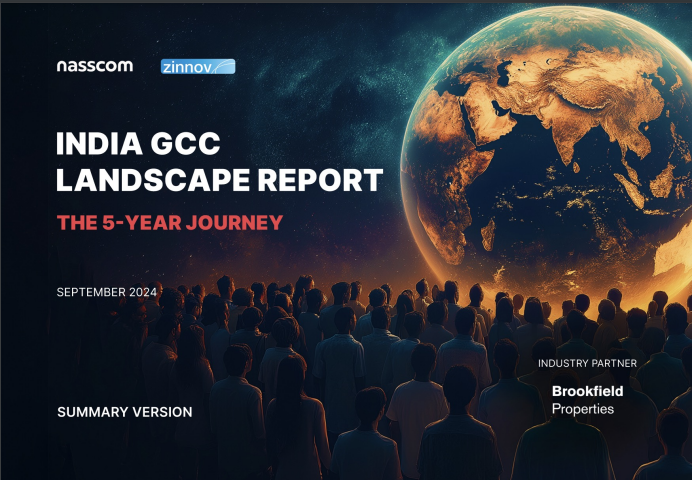News and Insights
India GCC Landscape Decoded: The 5-Year Report by NASSCOM & Zinnov
October 3, 2024
This briefing below summarizes the key findings from the “India GCC Landscape – The 5-Year Report” jointly published by NASSCOM and Zinnov. The report analyzes the growth and evolution of Global Capability Centers (GCCs) in India between FY2019 and FY2024, highlighting their increasing significance in the global technology landscape.
Key Highlights
- India: The “GCC Capital of the World”: With over 1700+ GCCs and 2975+ GCC units employing 1.9 Million+ talent, India holds the largest share of the global GCC market. Its rapid set-up rate, driven by talent availability, cost advantages, and a supportive ecosystem, solidified its dominance.
- GCC Maturity Roadmap: The GCC landscape in India has matured significantly, with 44% transitioning into “Portfolio Hubs” focused on end-to-end ownership, driving innovation, and assuming global roles. This signifies a shift from cost-optimization to value-driven operations.
- Dominance in High-End Engineering and Emerging Tech Roles: India leads in providing high-end engineering talent, with 32% of GCCs in the “Transformation Hub” stage having a high Product Management talent intensity. This expertise extends to emerging tech roles, driven by investments in AI, Cloud, Cybersecurity, and Blockchain.
- Driving AI-led Transformation: GCCs are increasingly driving AI-led transformations, evolving from cost centers to value-driven hubs. The report highlights a symbiotic relationship between GCCs and service providers, fostering innovation and development of cutting-edge solutions.
- Expansion of Global Roles in Indian GCCs: Companies are leveraging India’s deep capabilities in AI and advanced technologies, leading to an expansion of global roles within Indian GCCs. This reflects a growing trust in Indian talent and their ability to manage global responsibilities.
Important Facts and Figures
- GCC Growth:Number of GCCs grew at a CAGR of 4.6% between FY2019-FY2024.
- Total installed GCC talent grew at a CAGR of 6.3% in the same period.
- India GCC Revenue grew at a CAGR of 9.8% between FY2019-FY2024.
- Digital Technology Penetration:AI/ML and Data Science penetration across GCCs increased from 65% (FY2019) to 86% (FY2024).
- Cybersecurity penetration rose from 55% (FY2019) to 88% (FY2024).
- GCC Distribution:Tier-I cities like Bengaluru and Hyderabad continue to lead in GCC setups. However, Tier-II and Tier-III cities are emerging as attractive locations due to cost advantages and government initiatives.
- Future Outlook:The GCC market size in India is estimated to reach USD 99-105 Billion by FY2026.
- The GCC headcount is projected to reach 2.5-2.8 Million by FY2026.
Key Insights and Trends
- Shift towards Specialization: The report states that “Single-function centers have decreased by approximately 10X and dual-function centers have dual-function centers by approximately 10X and 7X respectively, since FY2019.” This indicates a clear trend towards specialized multi-functional GCCs.
- Rise of ER&D: The average size of ER&D GCCs increased substantially from 400 employees in FY2019 to 500 employees in FY2024. This highlights the increasing focus on high-value work and innovation.
- Importance of Partnerships: A key factor contributing to GCC growth is the “symbiotic relationship between GCCs and service providers.” This collaborative ecosystem fosters innovation and accelerates the development of cutting-edge technologies.
- Focus on Digital Transformation: GCCs are heavily investing in digital transformation initiatives, particularly in AI and ML, driving significant growth in the ER&D sector.
Future Outlook for GCCs in India
The report predicts a bright future for GCCs in India, with continued growth anticipated across various parameters. However, it emphasizes the importance of:
- Global Managerial Roles: GCCs will need to define global charters and navigate complexity through robust roles to maintain their leadership position.
- “The AI” Agenda: Leveraging the significant talent pool and experimenting with AI and innovative use cases will be crucial for future success.
- Innovation Incubator: GCCs will need to drive innovation through strategic partnerships and collaborations within the Indian ecosystem.
- “India to India” Service Monetization: Unlocking new growth and profitability by monetizing India-specific services will be key for GCCs.
- Leadership in Sustainability: Embedding sustainability practices into global business operations will be critical for long-term success.
The Indian GCC landscape has undergone a remarkable transformation in the last five years, evolving from cost-effective destinations to strategic hubs driving innovation and global value. With a strong foundation, supportive ecosystem, and a focus on digital transformation, Indian GCCs are poised for continued growth and will play a pivotal role in shaping the future of the global technology landscape.
Download the summary version here!
TAGS: Technology, Research

